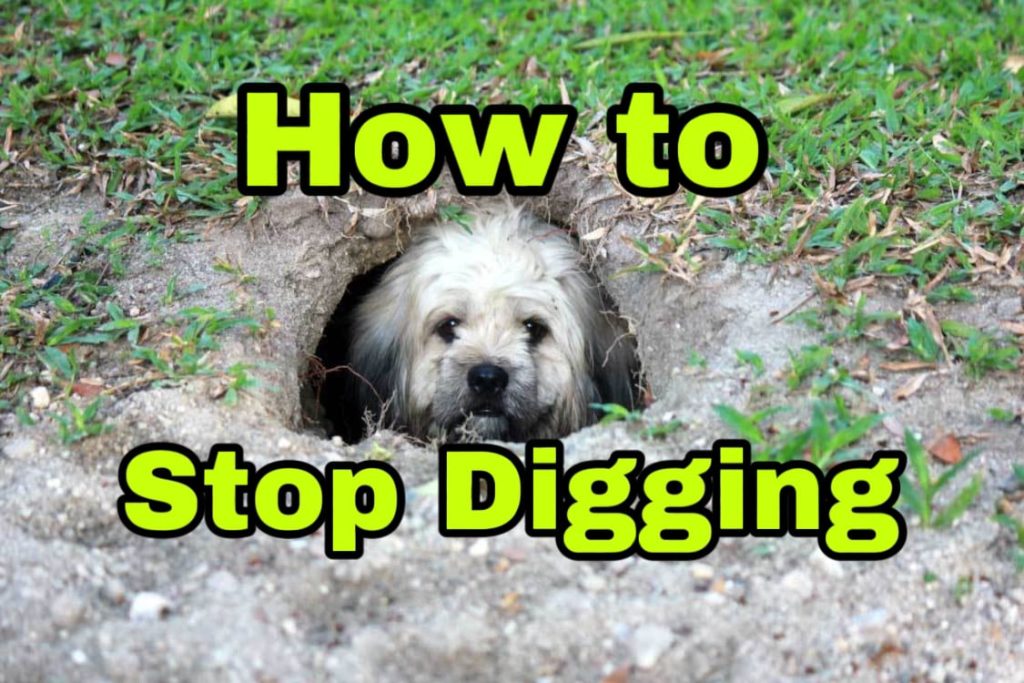Excavation Behavior in Dogs: Causes and Solutions

The Playful Instincts of Dogs and Their Digging Behavior
Dogs are known for their playful and curious nature, but sometimes their behaviors can lead to frustration for pet owners, particularly when it comes to excavation behavior. This instinctual activity involves digging and burrowing, which many dog owners might consider harmless antics but can lead to significant damage to yards and gardens. Understanding why dogs dig is crucial for developing effective strategies to manage this behavior.
Understanding Excavation Behavior
Excavation behavior in dogs can be attributed to a variety of factors, including:
- Instinctual Drives: Certain breeds have been historically bred for digging activities. For example, terriers such as the Jack Russell or American Staffordshire Terrier have an innate drive to dig as they were traditionally used for hunting vermin underground. This strong instinct often cannot be curbed entirely without proper interventions.
- Boredom: Dogs that are left alone for long periods may resort to digging as a form of entertainment. A lack of physical exercise and mental stimulation can lead to destructive behaviors. Engaging your dog with toys, puzzle feeders, or regular exercise can help mitigate this issue.
- Seeking Comfort: Dogs may dig to create a cozy space or nest, particularly in adverse weather conditions. This is often seen in breeds like the Siberian Husky or Alaskan Malamute, who might dig into the snow to create a warm burrow. Owners can provide sheltered areas or blankets to discourage this behavior.
- Stress or Anxiety: Factors such as loud noises from thunderstorms, fireworks, or separation anxiety can trigger digging behaviors. Dogs often dig as a coping mechanism in these situations. Identifying stress triggers and implementing stress-relief techniques like calming treats or anxiety wraps can prove beneficial.
Implementing Solutions for Excavation Behavior
Recognizing the underlying causes of digging is essential for implementing effective solutions. Addressing excavation behavior can enhance your dog’s quality of life while maintaining the integrity of your outdoor spaces. Solutions might include providing more daily interactive play, incorporating obedience training, or even creating designated digging areas in your yard where your dog can dig without causing damage.
Engaging in more outdoor activities together, such as hiking or playing fetch, can substitute for any boredom and minimize the urge to dig. Moreover, regular training sessions can reinforce positive behaviors while diminishing undesirable ones. For instance, teaching your dog commands like “leave it” or “no dig” can help manage their actions more effectively.
In conclusion, understanding the motivations behind your dog’s excavation behavior is not only crucial for maintaining a beautiful yard but is also essential for fostering a healthier, happier pet. By actively engaging with your dog and providing appropriate stimulation and comfort, you can significantly reduce the occurrence of digging while enriching your dog’s overall well-being. Stay tuned as we continue to explore helpful tools and strategies that both dogs and their owners can benefit from.

IMPORTANT: Click here to learn about toxic foods for pets
Decoding the Reasons for Digging
At its core, excavation behavior in dogs can often be traced back to deep-rooted instincts and environmental factors. Understanding these reasons is an essential step in managing and redirecting this behavior effectively.
To better appreciate why our furry companions dig, consider the following key motivators behind this seemingly puzzling activity:
- Natural Instincts: Many dog breeds possess intrinsic urges that are linked to their ancestry. Breeds renowned for their hunting capabilities, like the terrier group or the hound breeds, have a genetic predisposition to dig. This instinct can manifest in various forms; whether it’s searching for small animals, uncovering potential prey, or even just satisfying their curiosity, understanding these underlying drives helps owners grasp the necessity of digging for their pets.
- Energy Release: Dogs, particularly young and active breeds, require significant amounts of physical activity. When energy levels are insufficiently drained, it leads to boredom and restlessness. This pent-up energy often translates into digging. Ensuring that your dog receives daily exercise, through walks, runs, or play, can significantly reduce their urge to dig.
- Denning Behavior: Historically, dogs are pack animals that seek safety in dens. Digging mimics this behavior, where they aim to create a comfortable, secure area for themselves. This is especially prominent in pregnant females or during challenging weather conditions. Providing safe spaces, like a designated bed or crate, can alleviate the need for this instinctual behavior.
- Pursuit of Attention: Dogs are keen observers of their surroundings and often learn that certain behaviors elicit a response from their owners. If a dog realizes that digging draws attention, whether positive or negative, they may repeat the action as a means of seeking interaction. Reinforcing positive behaviors through training and rewarding good choices is essential in breaking this cycle.
- Environmental Factors: Sometimes external circumstances contribute to digging behavior. For example, a yard filled with enticing scents, such as those from burrowing animals or insects, may prompt a dig. Additionally, changes in the household environment, such as moving to a new home or the introduction of new pets or family members, can instigate stress-induced digging. Recognizing these triggers is key to implementing effective solutions.
By taking the time to identify these various causes, dog owners can tailor their approach to managing excavation behavior. Next, we will explore practical solutions designed to address these factors, enhancing both the owner’s experience and the dog’s quality of life.
| Cause of Excavation | Solution Strategies |
|---|---|
| Boredom | Engage in interactive play and provide stimulating toys. |
| Instinctual Behavior | Create designated digging areas for them to explore safely. |
| Anxiety | Implement training and behavior modification techniques. |
| Attention-Seeking | Reward positive behaviors and ignore excavating actions. |
Understanding the underlying causes of excavation behavior is essential in addressing this common issue. Dogs often dig out of boredom, instinct, anxiety, or the desire for attention. These behaviors can stem from natural instincts, especially for breeds known for their digging prowess. By recognizing these motivations, owners can implement appropriate solutions tailored to their dog’s needs. Providing interactive playtime and mental stimulation, as well as creating a digging zone, can significantly reduce unwanted excavating. Training sessions combined with positive reinforcement for desired behaviors can effectively redirect a dog’s focus. Ultimately, being proactive in understanding and addressing your dog’s excavation behavior can lead to a harmonious living environment.
DON’T MISS OUT: Click here for essential tips
Implementing Solutions to Alleviate Digging
Once the underlying motives for your dog’s excavation behavior are identified, implementing effective solutions becomes paramount. The approach should be tailored to your dog’s specific triggers and needs. Here are several strategies that can aid in addressing and reducing this behavior:
- Increased Exercise: One of the most effective solutions is to enhance your dog’s physical activity. Regular walks, engaging games of fetch, or puzzles that require mental engagement can dramatically lower a dog’s energy levels. For high-energy breeds, consider providing them with strenuous activities such as agility training or jogging. These activities not only channel excess energy but also foster a stronger bond between you and your pet.
- Designated Digging Area: If your dog has a strong digging instinct, consider creating a specific area in your yard where digging is acceptable. This designated “dig pit” can be filled with sand or soil and made attractive to your dog with toys or buried treats. By allowing your dog a safe space to dig, you can curtail unwanted digging elsewhere, reframing the action as a positive behavior.
- Positive Reinforcement Training: Training plays a critical role in modifying any behavior. Utilize positive reinforcement techniques to encourage desirable actions while discouraging digging. When your dog refrains from digging in inappropriate areas, reward them with praise or treats. Additionally, teach commands like “leave it” or “come” to redirect attention whenever they start to dig.
- Utilizing Deterrents: For stubborn diggers, applying deterrents can be beneficial. Natural repellents such as citrus scents or vinegar can be sprinkled in the areas of concern, as most dogs tend to avoid these smells. Remember to avoid harsh chemicals that could harm your dog or the environment. Moreover, placing physical barriers like garden fencing can help protect specific areas of your yard from being excavated.
- Manage Boredom: Keeping your dog sufficiently mentally stimulated is crucial. Interactive toys, treat-dispensing puzzles, and even engaging in training exercises can keep their mind occupied, reducing the impetus to dig out of boredom. Incorporate a variety of activities throughout the week to sustain their interest, as routine can lead to discontentment.
- Consider Professional Help: If your dog’s digging behavior persists despite your efforts, seeking the guidance of a professional dog trainer or animal behaviorist might be warranted. These specialists can provide insights tailored to your dog’s specific behavioral issues and offer advanced strategies for effective management.
- Veterinary Consultation: In some cases, persistent digging can signify underlying stress or health issues. If behavioral changes coincide with digging, consulting your veterinarian is vital. This ensures that your dog’s health is optimal, as well as ensuring peace of mind for the owner.
Understanding excavation behavior in dogs is a multifaceted endeavor that requires patience and dedication. By employing a combination of these strategies, pet owners can create a harmonious environment that mitigates excessive digging while fulfilling their dog’s natural instincts and engaging their physical and mental needs.
DISCOVER MORE: Click here to learn about how exercise boosts your pet’s mental well-being
Conclusion
In summary, understanding excavation behavior in dogs unveils a complex interplay between instinct, environment, and emotional well-being. By identifying the root causes of digging, such as instinctual drives, stress, or boredom, pet owners can implement more effective strategies tailored to their pets’ needs. Whether through enhancing physical activity, creating engaging spaces for digging, or utilizing positive reinforcement training, the solutions are as diverse as the dogs themselves.
Moreover, recognizing when to consult a professional or a veterinarian adds another layer of support for both the dog and owner. Remember, addressing digging behavior is not just about stopping the action itself but understanding and redirecting your dog’s natural instincts in a productive manner. A proactive approach fosters a positive bond and enriches your dog’s life, paving the way for a happier, healthier pet.
As you embark on this journey to manage your dog’s excavation tendencies, embrace the notion that every challenge can lead to a deeper understanding of your furry companion. Stay curious, remain patient, and be prepared to discover new dimensions of your dog’s personality along the way. For pet owners facing this common issue, the time and effort invested into understanding and addressing excavation behavior can lead to rewarding insights and lasting solutions.



